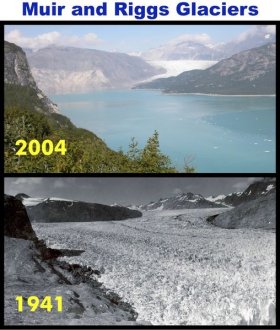Main Reasons of global warming
There are two major effects of global warming:
- Increase of temperature on the earth by about 3° to 5° C (5.4° to 9° Fahrenheit) by the year 2100.
- Rise of sea levels by at least 25 meters (82 feet) by the year 2100.
More details and secondary effects of global warming :
Increasing global temperatures are the primary effects of global warming. However they are causing a broad range of additional, secondary effects :
- Sea levels are rising due to thermal expansion of the ocean, in addition to melting of land ice.
- Amounts and patterns of precipitation are changing. The total annual power of hurricanes has already increased markedly since 1975 because their average intensity and average duration have increased (in addition, there has been a high correlation of hurricane power with tropical sea-surface temperature).
Changes in temperature and precipitation patterns have also global effects on extreme weather events: They increase the frequency, duration, and intensity of floods, droughts, heat waves, and tornadoes. Other effects of global warming include higher or lower agricultural yields, further glacial retreat, reduced summer stream flows, species extinctions. As further effects of global warming, diseases like malaria are returning into areas where they have been extinguished earlier.

Glacier retreat of Muir glacier: Comparison photos of Muir and Riggs Glaciers in Glacier Bay National Park and Preserve, Alaska. Muir glacier, parts of which were greater than 65 meters thick in 1941, has retreated out of the image in 2004 (towards the upper left) as an effect of global warming. The distance to the visible Riggs glacier in 2004 is ~3 km. During this time, the Muir Glacier retreated more than 20 km (Picture from global warming art



|
Automobile Engineering Mobile Application (Ashish Kumar)
|